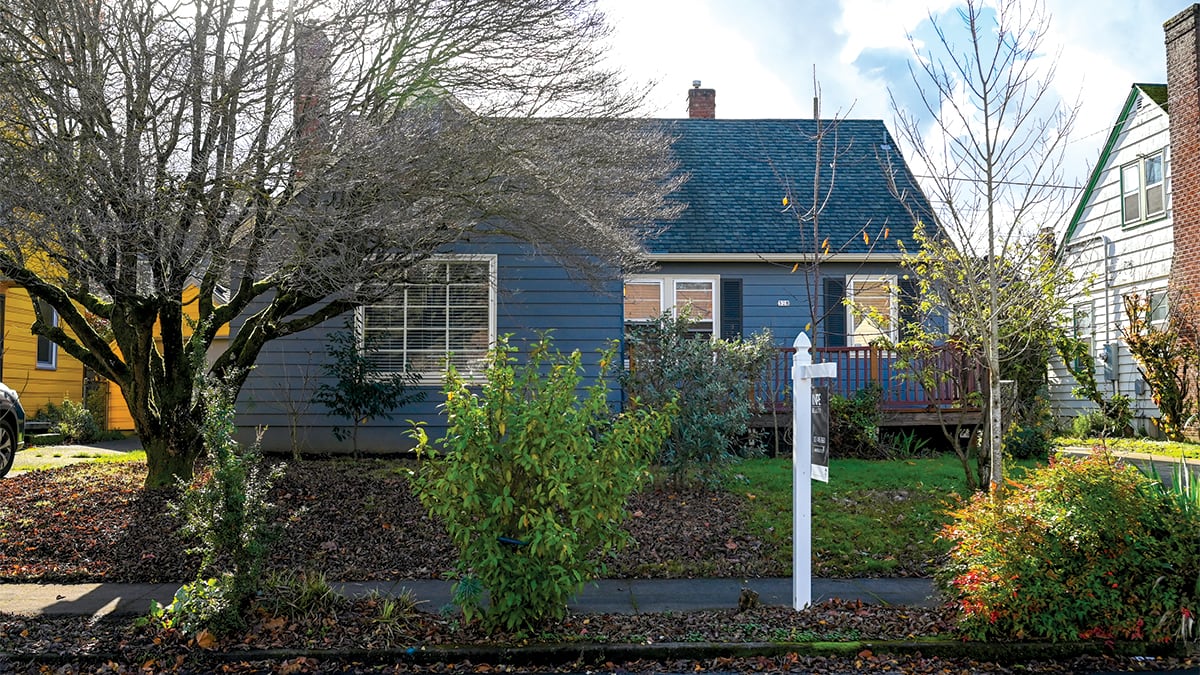A house on North Russet Street in the Piedmont neighborhood sold in late June for top dollar. The three-bedroom, 2,652-square-foot single-family home, with a brick fireplace and detached garage, sold for $661,600. Two months later, the owner put it back on the market.
But it hasn’t sold, and the house is still empty. Now neighbors say it is attracting squatters.
It was Zillow, a publicly traded online realty company, not a conventional homebuyer, who purchased the Russet Street house on June 29, along with 150 other homes in the Portland area it bought over eight months.
Zillow, who bought more than 15,000 homes across the country in 2021, hoping to capitalize on the hot real estate market, announced early in November that it was no longer buying houses and would sell many of them.
“We’ve determined the unpredictability in forecasting home prices,” said Zillow co-founder and CEO Rich Barton in a Nov. 2 press release, “far exceeds what we anticipated.”
Zillow tried to apply artificial intelligence to an entrepreneurial pursuit that has long been the province of mom-and-pop operations: buying, fixing up and flipping single-family homes. With its access to capital, a nationwide data base of home values, and a brokerage license, the company hoped to consolidate and streamline a highly fractured business.
But to the relief of flippers and brokers across the U.S., Zillow now admits it got schooled. The house on Russet Street shows what can happen when a high-tech firm gets its hands dirty in a business that is local and specific to each market.
“There is a sense of relief and satisfaction understanding that this business is not something that can be done digitally,” says Hector L. Garcia, a principal broker at John L. Scott Real Estate. “It is a face-to-face seeing that people are making the biggest financial decision of their lives, and that should be done with trusted servants.”
Neighbors of the Russet house agree.
“It’s like Amazon moving in across the street,” says Andrew Harrison, 43. “I don’t really care for that idea.”
It’s odd for a house to sit vacant in Portland’s red-hot real estate market. Between September 2020 and September 2021, the average price of a residence in Portland increased by 17.5%, from $485,200 to $570,200.
Housing supply is low—with only 3,344 active residential listings in September. That’s about half the number of homes that were on the market in September 2019.
But Zillow still has a lot of inventory to offload.
Zillow bought 151 homes in Multnomah County between March 5 and Oct. 5, according to the county assessor’s office. The company has sold only 22 of those homes, with the most recent being sold Oct. 1.
Most of the sales resulted in modest profits, ranging from $300 to $44,471. On six of the houses, however, Zillow lost money—between $400 and $24,700.
Brokers say the homes that Zillow owns and is now trying to sell in Portland have not depressed the overall market for single-family homes, simply because Zillow does not own enough homes to weigh the market down.
“Compared to the bulk of transactions that the combined workforce of Oregon realtors does compared to Zillow,” says John L. Scott’s Garcia, “I think it’s just a drop in the bucket.”
Zillow claims to offer the same personal experience as local realtors. A company representative told WW it has responded to neighbors’ concerns in Piedmont.
“Every market we have Zillow Offers in, we have a local broker partner that was established in the area before that we basically team up and they sell our homes and take care of our homes in the same way that they always have in the community,” says Matt Kreamer, a Zillow spokesman. “We sell them in exactly the same way any brokerage in town would sell them, and we use a local brokerage.”
But exiting the homes sales business could be painful.
The house in Piedmont exemplifies Zillow’s exuberance. Zillow bought the property in July for $661,600 and put it back on the market in September for $681,900. After two months, Zillow lowered the price to $609,900, $51,700 less than what the company had paid for it.
The house is now off the market while Zillow fixes damage caused by a break-in.
“[The house] looks wonderful on the outside, but it doesn’t look as wonderful as the asking price,” says Dawn Panttaja, 62, a neighbor. “I think people drive by and they sort of laugh.” (The assessed value of the home for tax purposes is $180,390, and the assessor pegs the market value at $496,790. Both values usually lag behind what buyers are willing to pay.)
Conventional real estate brokers keep close watch on the homes they have for sale, walking through them with prospective buyers and generally keeping an eye on them. One of the ways Zillow sought to save money was by reducing labor costs: Prospective buyers could access homes on their own using a Zillow app to visit without a broker.
In practice, neighbors of the house in Piedmont say, that meant low security and easy access for squatters.
“[People] can get right in the back,” notes Panttaja.
Harrison agrees with her safety concerns. “I know that there were needles in the garage,” he says. “There’s been food and people showering in [the house] and camping in the back.”
Harrison is fed up with having Zillow as a neighbor.
“I have two kids,” he says. “I’d like there to be actual neighbors [across the street] as opposed to transients.”
